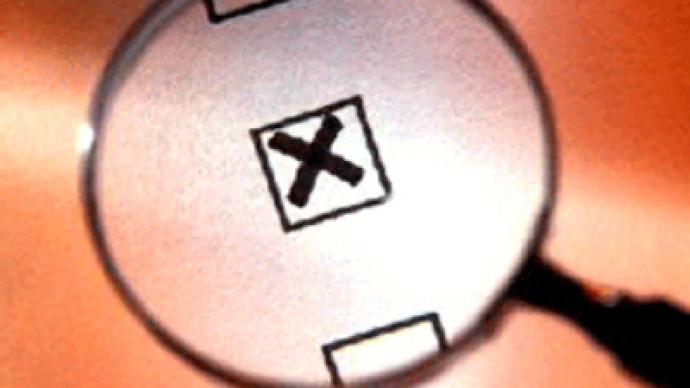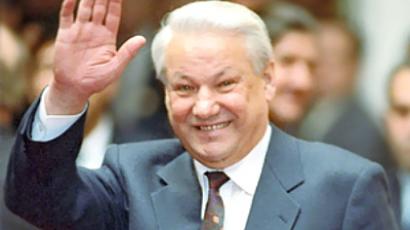RT presents: Russia's Choice

Dmitry Medvedev has gained 70.2% of the vote in Russia
Election day in Russia is over and the votes are being counted. Already there's little doubt over who is set to replace Vladimir Putin as the country’s next president. Dmitry Medvedev has what looks like an unassailable lead.
Stay with RT!
March 3, 2008
Sergey Khrushchev is Senior Fellow in International Relations at Brown University in the United States. He is also the son of Nikita Khrushchev, leader of the Soviet Union for nearly a decade during the Cold War. He joined RT to give his views on Sunday's presidential election, which, he says, was a ‘huge step towards democracy in Russia’.
Khrushchev believes the election will prove to be very important for Russia’s history.
“The biggest difference between democracy and autocracy is the respect for the law. In a democratic country we have to respect the law, whilst in autocracy we prefer the good will of the leader. And here, for the first time in Russian history, we see the person who was in power voluntarily leaving. When all Russia begged him on knees ‘please stay longer’, Putin said ‘No, we cannot change constitution in interests’”, he said.
Maria Sladkova, a post-graduate student of Russian State Humanitarian university, filled RT’s viewers in on education in Russia.
“It can be a matter of choice, or a matter of one’s social status, whether you’ve got money for this or not. It is possible to get private paid education, or you may go to a state university to try and get free education,” Sladkova said.
An actress and a student of one of Moscow’s Boris Shchukin’s drama school Laura Keosayan spoke about the trials and tribulations of her trade in Russia and of course the Stanislavsky Method.
“A good professional is someone, who has had a good schooling: at least four years of study and then theater of course, you have to go there to work for yourself, not for the money, hence they don't pay much,” Keosayan said.
Andrey Danilenko, the Head of Russian Farms Group and successful businessman told RT about the current state of things in Russian agriculture.
“Agriculture in Russia is all about big landowners. Because the Soviet Union was ahead of the world by setting up large collective farms, which were, in essence, the prototype to large corporate farming. Today the reality is that the only way to be competitive is to be large,” Andrey Danilenko said.
Andrey Chuzhakin, Professor at the Linguistic University compared Russian's past and present linguistic positions.
“Now, more then ever people who don’t master a foreign language are facing a disadvantage in Russian society. On the contrary Russian as a foreign language reached its heights of popularity in the 1980s, with Gorbachev and Perestroika. Now Russian shares the 7-8 place in the rating of world languages with Portuguese, back then it was the third,” Chuzhakin said.
Regional Director of MmD Russia, Stephen Lock, gave political advice to multinational companies. He says property development, retail and banking are all hot spots for foreign investors.
“Business is about a commercial return…Business sees a long-term change in Russia, a change that is already underway and I think in some ways western politicians will play catch-up with that in the next few years,” he said.
Political analyst Viktor Mizin said that new trends in Russia's foreign policy do not mean a new Cold War. He also speculated on America's next leader.
“Some people say that probably McCain would be a disaster but I do not think this way. In the Soviet era and in the new Russia era we managed to deal even with the Republicans, even with the straight talking people. The Democrats, especially when they put their stakes on human rights, probably it could be a danger but there is another problem: for example if Obama wins or Mrs Clinton, there are themes like fight against global terrorism, like Iran or Iraq – you cannot solve them while getting bad relations with Moscow,” insisted Mizin.
Election commission spokesperson Aleksey Gromov told RT that a record election turnout of 68% in St Petersburg is no surprise, as both Vladimir Putin and Dmitry Medvedev come from there.
“People think that they should go to the elections because Dmitry Medvedev is the man who has managed Russian national projects which did come to schools hospitals and homes - it’s a sort of gratitude,” commented Gromov.
The Chairman of Russia's State Duma International Committee, Konstantin Kosachev, told RT that Putin is admired by most Russian voters.
“This situation is unique in our modern history, when the President leaving his position is more popular than when he was elected,” he said. “The ruling powers of Russia have managed to work for the interests of the majority of the Russian population,” Kosachev noted.
Dmitriy Bagrov, an IT specialist from St Petersburg, believes cultural proximity with the West gives Russian producers an advantage compared to other popular software destinations.
“I’ve heard a lot about why Russian companies were chosen over Indian or Chinese ones. The first and the main reason, of course, apart from being professional and having necessary knowledge, was the cultural proximity,” said Bagrov.
Tatyana Malkina, Editor-In-Chief of the Otechestvennie Zapiski magazine, spoke to RT about how civil society is developing in the country.
“I don’t think people should be politicised in Russia or anywhere else, that’s not the question,” she said. “But I think, that Russian people are too stoic and too patient, they don’t take the initiative and don’t take the responsibility for their own lives,” Malkina added.
Fedor Lukyanov, Editor-in-Chief of the Russia in Global Affairs magazine, commented on RT about Russia’s foreign policy under Vladimir Putin.
“The message of Putin was that Russia still is a great power,” he said. “The international environment is now more multipolar and more interesting than before, I would say. But now the task of Dmitry Medvedev will be to convert this general abstract status into practical benefits for the Russian nation,” he added.
Sochi winning the Olympics in 2014 was one of the brightest moments for Russia in 2007. Dmitry Chernyshenko, CEO of the Sochi Bid Committee, believes its team philosophy was perfect.
“The great coincidence of such factors as the Olympic movement ideals and our vision for the future brought us the success,” said Chernyshenko.
Viktor Vakhstein, from the Golos Association, told RT that Medvedev had a clear advantage in the media.
“There was a huge disproportion in media coverage between Mr Medvedev and all other candidates,” he noted. “Medvedev was mentioned in 64% of publications, which is twice more than other candidates all together,” Vakhstein said.
Natalya Zamarayeva, Senior Scientific worker of the Oriental Studies Institute, says history and shared values bind Russia and Central Asia together.
“Central Asian countries and Russia have not only common economic interests, but also common history,” said Zamarayeva.
“Russia is back’ – that was Putin’s main message to the international community, believes Andrey Kortunov from the New Eurasia foundation.
“Russia’s not going to be a junior partner to any other state. Russia has its own interests, which it is committed to defend,” Kortunov stressed.
Matthew Maly, economic expert and author of a book called “Russia as it is”, believes Putin has been driving Russia towards democracy, though the western media’s perception of an election may be different.
“Western media represents democracy as a bowl of instant noodles, which everybody knows how to cook and everybody is supposed to like. If a favourite of western media wins an election they claim it’s a democracy. As a result we have a ’democracy’ in Kenya or in the Palestinian state,” said Maly.
Egor Gavrilov, a political analyst from the Russian State University of International Relations, joined RT to share his views on Russia's political legacy and future.
“We can say that while Yeltsin’s era can be characterised as a certain retreat of the state, Putin’s era is, vice versa, the era of the return of the state apparatus both into the public and economic spheres of society,” Gavrilov said.
Kirill Koktysh of the Moscow State University of International Relations, joined RT to discuss the development of Russia’s relations with the CIS countries, and Belarus in particular.
Aleksey Kuzmin, Chairman of the Expert Council of the National Prospects Foundation in Moscow, joined RT to speak in detail of the four presidential candidates.
He says Dmitry Medvedev “is perfectly equipped for bureaucratic games”.
“He has got a very serious experience. He was the First Deputy Prime Minister and he had the burden of National Projects on him,” Kuzmin said.
He also commented on the chances of other candidates winning the election, and gave a short review of their political careers.
Andrey Zolotov, Editor-in-Chief of Russia Profile magazine, said to RT that the next few months will be an interesting period in the country's political development.
“What’s coming is actually very intriguing because what we can see in the next several months is the formation of the new system of power,” Zolotov said.
Igor Chestin, the head of the Russian branch of the World Wildlife Fund, joined RT to talk about environmental matters. He says despite some positive changes, there’s a lot to be done to improve the situation in the country.
“There were dramatic changes when Putin came into power. With new administration the environmental committee was dismantled, so there has been no environmental agency in the structure of the government for the past eight years. In that sense we compared Russia to other countries, and we found only one which also doesn’t have a special designated environmental agency – that’s Honduras,” Chestin said.
Richard Weitz from Hudson Institute, Washington DC, commented to RT on how Dmitry Medvedev is viewed in the United States.
“The general feeling is that he is very much Putin’s protégé, but there is also understanding that he may or may not necessarily follow Putin’s policies. He is not well-known among the U.S. people,” Weitz said.
Dmitry Suslov from the Council for Foreign and Defence Policy in Moscow joined RT to speak on the probable reaction to the election result in the West and the possible changes in Russia’s foreign policy.
“Despite certain reservations that will be and despite the absence of the OSCE monitors’ team, I think that generally election will be accepted quite positive. Since Medvedev was named by Putin as the person he would like to see as the next President, we’ve seen some positive reaction from the U.S., namely from Condoleezza Rice, from European countries and so on,” Suslov said.
Yury Mamchur is a director of the Real Russia Project, an educational project of the Discovery Institute based in Seattle and Washington, which is aimed at being a credible source of information about Russia.
Speaking about how America views the possibility of Dmitry Medvedev becoming the new president, he said he thinks ”it’s a given fact and it has been for a couple of weeks."
“Some see him as a ‘puppet of President Putin’ who will not have voice of his own and who will serve just as a shell for President Putin to continue his own work and leadership of the country,” Mamchur said.
However, he says, some Americans, including many businessmen, see positive changes coming.
“Some think he is the most liberal and progressive, and the youngest member of Putin’s team. He is the only one who doesn’t come from ‘siloviki’ – those with former intelligence services or military backgrounds,” Mamchur said.













